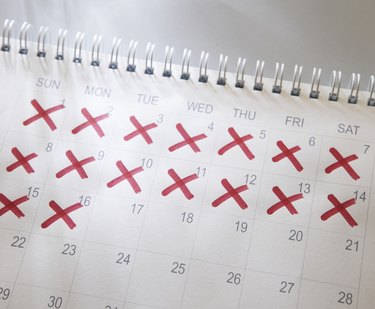
To lose 110 pounds without surgery, you must establish new healthy eating patterns, gradually increase your activity level and follow sound weight-loss principles.
Strategies
Video of the Day
In addition to ongoing and serious health problems, severe obesity can shorten your lifespan and make necessary surgery dangerous due to concerns with the anesthesia. Christoper Cannon, lead researcher of a 2009 study in the "Clinical Cornerstone" journal, found that 63.3 million American adults had obesity, with a BMI of greater than 30. Although surgical interventions result in weight loss, you can achieve the same results without the risk by making permanent lifestyle changes. Cannon indicated that to lose weight, you must change your diet and your level of physical activity.
Video of the Day
Time and Goal Setting
Although you may want to lose your weight immediately, the reality is that it takes a long time to lose 110 pounds. A reasonable expectation for weight loss is between 1 to 2 pounds a week after the first few weeks of your program. If you consistently lose 2 pounds a week, it will take you slightly more than a year to lose your desired weight. Weight loss rarely happens on a consistent basis. Be mentally prepared to have your weight loss stop and start during the process to avoid disappointment and feel tempted to quit.
First Six Months
During the first month of your healthy weight-loss program, you may lose weight more rapidly due to both calorie reduction and losing excess water. After the first month, your weight loss may slow down to a more reasonable pace. If you lose 15 pounds the first month, you will have less than 100 pounds left to lose. During months two to six, weigh regularly and monitor your caloric intake. Unless you are under a doctor's supervision, you must have at least 1,200 or 1,500 calories a day. Females may eat the lower amount and males the higher. Choose low-impact exercises such as swimming, slow walking or riding a recumbent stationary bike to reduce the chance of joint injuries.
Second Six Months
If you lost about 50 pounds during the first six months of your diet, you will be almost halfway to your goal. Your second six months and beyond will likely be a time of rapid change in your body size and feelings about your appearance. Continue eating plenty of low-fat dairy and protein, fruits and vegetables and whole grains, while stepping up your exercise routine. More strenuous exercise causes you to burn more calories, which may help you avoid a weight loss plateau.
Considerations
More important than how long it takes you to lose weight, is the fact that you lose weight. According to the Centers for Disease Control and Prevention, even a small percentage of weight loss -- as little as 5 to 10 percent of your bodyweight -- begins to offer you benefits in terms disease reduction and energy levels. Be patient as you work at losing weight, and focus on making good choices one day at a time.
- National Institutes of Health: Overweight
- Clinical Cornerstone: Treatment of Overweight and Obesity: Lifestyle, Pharmacologic, and Surgical Options
- National Heart, Lung and Blood Institute: Why Is a Healthy Weight Important?
- Weight-Control Information Network: Active at Any Size
- Centers for Disease Control and Prevention: Losing Weight
- Centers for Disease Control and Prevention: Assessing Your Weight